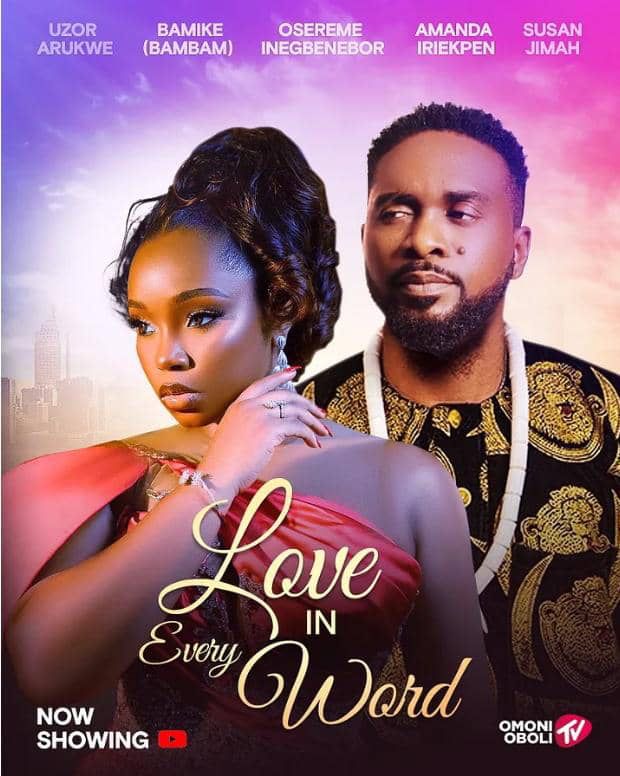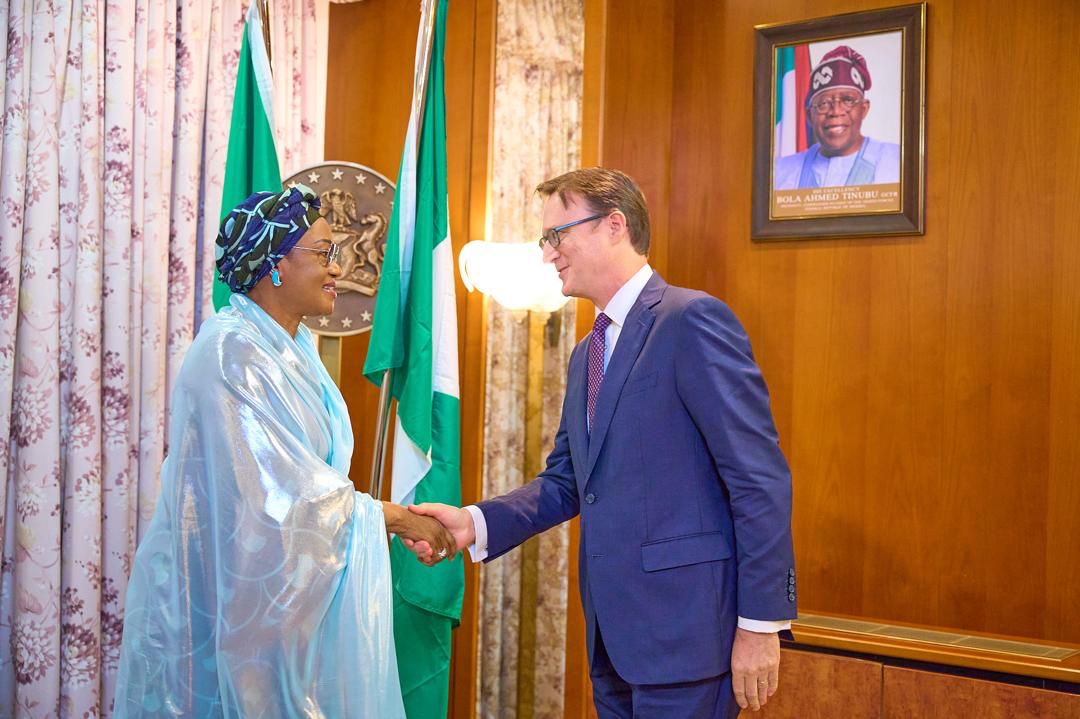By Amadi Chimaobi Kingsley
‘Love in Every Word” is a 2025 Nollywood romantic drama produced by Omoni Oboli and written by Mfon-Abasi Micheal Inyang. The film stars Bamike ‘Bam Bam’ Olawunmi-Adenibuyan and Uzor Arukwe in the lead roles
Upon its release on YouTube, “Love in Every Word” garnered significant attention, amassing over 4.3 million views within 72 hours and passed 7m views when it was taken down, reportedly due to copyright issues over some drone clips used in the movie, but that setback which was quickly resolved has further stirred public interest in the movie. Audiences have praised the film for its authentic portrayal of contemporary relationships and the palpable chemistry between the lead actors. Bam Bam’s performance has been lauded for its depth and sincerity, marking a notable achievement in her acting career.
In Love in Every Word, Odogwu Obiora aka Odogwu pararan wants you to know that odogwu no be guy name. And he does a lot to prove that. He’s a talk and do guy, a man of words and action to match, and so I believe that’s where the apt title comes from.
Like most YouTube movies, this is a self-contained one featuring a small cast that is very reflective of the tight budget used to bring the story to life. It’s mostly Uzor Arukwe and BamBam Adenibuyan as Odogwu and Chioma, respectively, with a very small group of recurring actors who play a revolving array of characters we see. Thinking back now, I counted seven (7) characters in total, which makes sense, if you want a picture that looks half as decent as what you might get on a big budget production, you want to keep overhead costs as low as possible and rely mostly on the strength of the story at hand to keep viewers invested. This does that well enough.
Chioma is a woman fresh out of a dead-end, two-year relationship with Davis—a man so uncertain about life, you’d think he was waiting for divine intervention to chart a new course. Then comes Odogwu, a self-assured businessman in his mid-40s, unmarried but undeterred. The film tries not to raise a lot of dust about him being unmarried at his age or the age difference between them also why see Odogwu at the first scene and be lost so much that she couldn’t hear her sister anymore???
One thinks that scene would have blended more with the story without raised eyebrows if he was the only one checking her out, and she was more like, “mm, he’s fine,” flings her hair, and continues chatting with her sister.
Also, it seemed the editor or director or whoever, was confused on whether to make that scene a slow motion or not.
The first time Odogwu meets Chioma, he declares his intent to marry her. Just like that. The story tries to paint it as a love-at-first-sight incident for him. An intentional man who knows what he wants and isn’t afraid to go for it. For her? Maybe not immediately, but it’s hard to deny she’s drawn to his presence. She laughs at his audacity at first, but the second time he repeats himself, there’s something in her gaze—intrigue, maybe even admiration. Some love stories are written in the stars; this one feel like it was inked with bold strokes.
There is this common stereotype about the Igbo men – being misogynistic. No, Odogwu corrected it. He was in support of Chioma chasing after her career and ambitions, he wasn’t against it. He wanted her to win, not just as his woman but as a person.
We establish there is mutual attraction on both ends by the first one-third of the movie, so what then do we spend the remaining two parts doing, you might be wondering. We watch Chioma struggle with making peace with Odogwu’s intrusive Igbotic accent and a last-minute “twist’ of Chioma’s paternity issues and why it’s the real reason behind her indecisiveness with accepting Odogwu’s proposal.
But this movie does not tell the usual Nollywood Cinderella story – the penniless girl meets a prince or rich businessman who completely changes her life overnight. The vulnerability of the female lead in this case is not based on the emptiness of her wallet but on being disappointed by the men in her life.
The picture is relatable on various fronts and thus resonates with viewers. For instance, besides the who no want better thing vibe created by the male lead, Obiora, also called Odogwu’s lavish attention and gifts to the lady he is wooing, Chioma, the mother’s concern for her successful daughter’s single state and Chioma’s insistence on her spec are part of the persistent back and forth we often see in families with marriageable daughters. The question is usually, “How long will you hold out for your spec while time is flying, and eligible bachelors are equally flying off the shelves?”
Furthermore, the issue of choosing between a salary job and self-employment which is a dilemma Chioma faced has been extensively debated by many people. It’s an issue which many Nigerians ponder over in the current ailing economy and their varied considerations are captured in a vox pop on the subject.
The movie also shows that even sophisticated, financially independent women are still little girls at heart who just want to be spoilt as seen by Chioma’s excitement over the gifts Odogwu showers her with and her friends’ spirited jubilation when he bought them diamonds. Contrast with that when Chioma, her patience exhausted, stripped and kicked out her dependent, serial-failing boyfriend.
Moreover, although women are often said to be indecisive, Chioma’s mixed signals to Odogwu which were getting out of hand were duly explained later as emanating from a childhood complex traceable to her father
A lesson here is to have friends that will fight for you. When Chioma was almost making a wrong decision, her friends were there to encourage her. One of them, who was a lawyer, helped get her money back from Chioma’s ex-boyfriend even when she didn’t fight it. It was the money she used to regain her perfume business. Have friends that will be there for you. I mean authentic ones. When Chioma was losing Odogwu, they went to him to explain a lot of secrets behind her actions and everything got sorted out.
Like, how would Chioma feel if she had lost Odogwu just like that? Nah, she won’t forgive herself.
The scenes that really stuck were the ones with Uzor Arukwe and Bambam. The ‘toastings’. The lines were good, well delivered, but really, there’s more to a love film than the lines. Most of the other scenes were bland. Like a brilliant scriptwriter once said, if it doesn’t drive the story, it shouldn’t be there. I believe the whole movie could have been told in a third of its actual runtime. But no one really takes short stories seriously in this part of the world. So, the need to nudge it on into endless minutes is understandable.
Everyone has praised the acting of Uzor and Bambam. I have respect for Uzor Arukwe and he’d need to flop badly before I can whip him but do we seriously think there are no actors in Nollywood that will best those lead roles?
For all its charm, there’s a smallness to the world of Love in Every Word that makes it hard to ignore that this is, indeed, a YouTube film. I’ve heard that it takes a bit of getting used to these kinds of movies, but it still needs to be said. There’s no real urgency to the conflicts and no sense that anything outside of Odogwu and Chioma’s bubble could shake things up. He courts her with the certainty of a man who knows no competition exists. And I know I said I love the lives of the 1%, but there are only too many stretches my brain can conveniently excuse for grand gestures.
One moment, he’s in Anambra; the next, he’s in Lagos, surprising her at work with a loud musical band. One moment, Chioma is randomly window-shopping at a diamond store with her friends, and the next, Odogwu waltzes into the same store —of all the many stores in the world— to buy diamonds for his conveniently mentioned niece who just graduated top of her class. Moments like these make this world feel overly neat, stripping away some of the realism the film otherwise excels at. They also open room for debate about whether Odogwu’s actions lean more toward grand romantic gestures or full-blown love bombing with a tinge of stalking.
This movie got me smiling from start to finish. It was more than just entertainment – it was a lesson in love, self-respect and cultural pride.
I rate this movie 7/10 because it was worth my time. I enjoyed it. Made me sit tight and have so much fun, and, yes, with lots of laughs














Leave a Reply